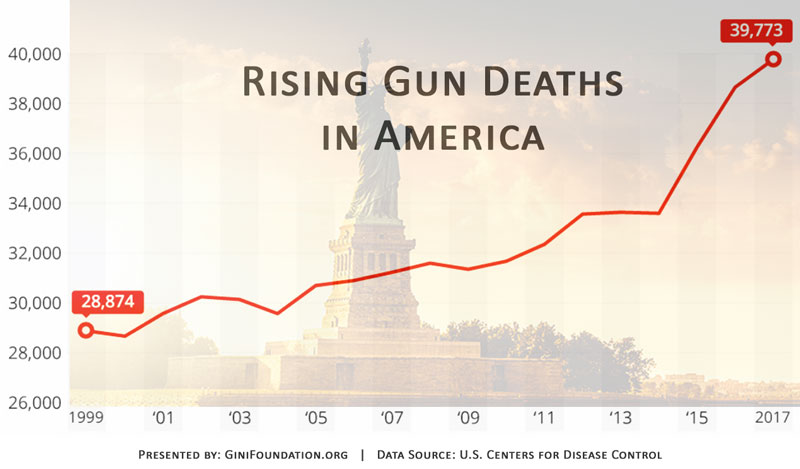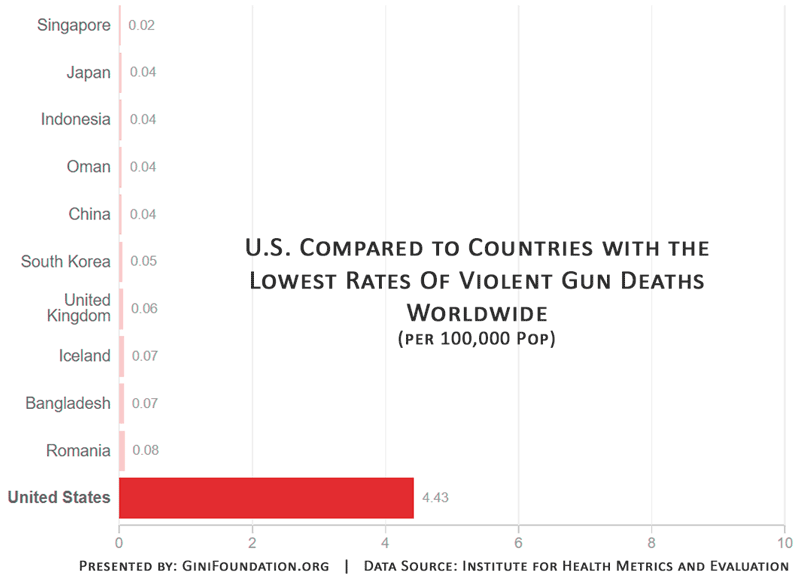How Can We Help?
Can We Prevent Evil Animals from Killing Innocent Humans?
This is part 2 of Gini's Gun Violence series. We strongly recommend reading each part in numerical order because each part contains logic based on the preceding parts.
- Part 1: Do Guns Enable Us to Defend Our Physical Bodies?
- Part 2: Can We Prevent Evil Human Animals from Killing Innocent Humans?
- Part 3: Do Guns Enable Us to Defend Our Democratic Freedom from Tyrannical Governments?
- Part 4: Sociopathic Behavior is at the Heart of All Threats to Democracy.
Can We Prevent Evil Animals from Killing Innocent Humans?
For all the reasons described in part 1, citizen gun ownership is a necessary evil from the perspective of anybody who has truly seen the evil that exists in this world. Of course, there is a lot of beauty and good people on Earth, too, but beauty and goodness are difficult to appreciate if you are dead.
How Many People Die from Gun Violence Every Year? Before discussing how to solve a problem, it's useful to summarize the cost of the problem. The chart below summarizes annual gun-related deaths in the U.S. in 2017. (The chart doesn't include the hundreds of thousands of non-fatal gun-related injuries per year.)

The death rates have been on an upward trend for years and this trend will continue for the reasons previously discussed.

Comparing Gun Violence in the U.S. to Other Countries. In contrast to other crypto/blockchain projects, corporate-funded think-tanks, self-serving politicians, profit-obsessed corporations . . . part of what makes Gini unique is we spend a significant amount of time and resources studying economic and governance data from many countries to put important socioeconomic issues into a more objective, nonpartisan perspective. We bring this same perspective to the gun violence debate. Like anything in life, without a broader perspective, it's impossible to know whether the problems we see in our communities and countries are unique to our country or if they're simply unavoidable features of the universe. With that in mind, let's compare gun violence in the U.S. to other countries.

One more chart:

What is the Fundamental Cause of Gun Violence? It's well-known that gun violence in America is worse than nearly all other OECD nations. Additionally, Asian countries have more community-focused cultures and stricter governments that tend to produce lower levels of violence. However, the charts above illustrate a reality that many people do not know: Gun violence in the U.S. is even worse per capita than many countries that westerners often perceive as barbarian terrorist states. This data is from the IHME, but it's consistent with the data we've seen from other nonpartisan sources over the years. So, clearly there is something about American society that causes a comparatively high amount of gun violence.
Unsustainable & Inequitable Economies Produce Violence. Violent video games might be a small contributing factor, but those games exist nearly everywhere in the world. Thus, based on all the data in the nonpartisan Gini book list, very deep statistical analysis, and many years of nonpartisan analysis, we are certain that America's highly inequitable and unsustainable economy is the fundamental cause of the majority of gun violence in America. Like a house of mirrors, these conditions distort all other economic, trade, labor, banking and social policies, which produces debt slavery, social anxiety, disintegrating communities, and deep ideological and political conflict. Under these conditions, higher gun violence and domestic terrorism are inevitable.
What Are the Financial Costs of Gun Violence in America? There have been a few studies (e.g., here and here), which estimate the financial costs to be up to $100 billion per year. As expected for any social problem that is difficult to objectively quantify, some people have derided those studies by pointing out their methodological flaws. These complaints are valid, but it's not reasonable to ignore the costs entirely. We may never be able to precisely calculate the actual costs, but whatever we believe the costs are, these costs represent significant negative externalities that are not paid by gun manufacturers today; instead, they're paid entirely by victims, their families and taxpayers. This is not an equitable outcome.
Gun Laws Are Not Enough. There's a ridiculously complex maze of gun laws throughout the U.S.; so, it's pointless to discuss any of the specific laws. Instead, let's simply assume that any determined individual can obtain a gun if they fulfill their state's legal requirements and any determined criminal can steal a gun from another gun owner. Under these real-world conditions, the only way to stop bad guys from doing bad things is to build accountability into the system. This is true for the architecture of economic and political systems and it's true for the technical design of guns.
Guns Should be Designed with Smart Locks. As a gun owner, a military veteran, a martial arts practitioner, a computer software engineer, an economist and a freedom-loving human who has spent over two decades studying many aspects of American and global economic, social and geopolitical systems, there is no doubt in my mind that smart gun locks are the only way to achieve balance among all the conflicting dynamics in the U.S. gun violence debate. Unfortunately, this is where special interest groups start to corrupt the decision-making process. Specifically, the gun lobby has spread so much fear, uncertainty and doubt about smart guns that it has been impossible for most gun stores to sell them. So, let's discuss the major points of resistance to smart guns that exist today.
"Smart guns won’t lower gun deaths very much". This is nonsense, assuming smart gun technology actually works reliably. (More on this below.) A significant majority of all gun crime is perpetrated by gun thieves. Thus, tens of thousands of human lives and corresponding costs would be saved every year if disabled stolen guns were useless to criminals. Additionally, smart guns would certainly prevent thousands of accidental deaths and spontaneous suicides. The vast majority of these deaths are committed by emotionally unstable people who have access to a family gun, which would not be possible with smart locks in nearly all real-world cases.
"All technology is hackable." This is not true in any meaningful sense. Every day we use technologies that are not "hackable" within any practical period of time. For example, it would take longer than the life of the entire universe to crack the SSL cryptography that protects encrypted emails, browser connections, VPNs and online banking transactions—even with quantum computers. The electronics and software in the commercial aircraft that fly us around the Earth at 30,000 ft are certainly not "hackable" by any random criminal on the street. In reality, the security of technologies are not all the same. There's an entire spectrum of problem-solving complexity that determines how "hackable" a given technology might be. Some tech is easily hackable; others are not. Obviously, before using any particular smart gun, we should make sure it's not hackable under any real-world conditions.
"Criminals will always find a way to kill even if they can't have guns." This is not a reasonable assumption for several reasons, but the most significant reason is this: Killing with a gun is the easiest way to kill. That's why murders with guns in 2016 were nearly 10 times more frequent than murders with knives. Killing with a knife and other close-range weapons is terribly messy and dangerous for the attacker. Additionally, close-range combat is an extremely emotionally intense experience for virtually all humans. Only the most sociopathic animals (a tiny fraction of the total criminal population) are able to kill with knives and non-projectile weapons with the same level of callous confidence as they can with guns.
"The technology will never be reliable enough . . . my iPhone still crashes sometimes!" This is what many people said about humans traveling to the moon; self-guided cruise missiles; heart surgery robots; self-driving cars; nuclear energy; pocket radios; x-ray and MRI scanners; DNA editing and gene sequencing; the Internet; electric cars; super-sonic flight; and many other inventions that were impossible until they became possible. In reality, technology always evolves to meet human needs and desires. The laws of physics are the only limitation to humanity's ability to innovate and solve hard technical and socioeconomic problems. Compared to all the examples above and many others, a smart gun is a simple technology.
"OK, then when will smart guns be truly reliable?" To put this into perspective: Tesla cars can already drive you around your city completely autonomously and more reliably than humans. Even for experienced engineers, that's a nearly incomprehensible technical feat, which dwarfs the engineering requirements of a smart gun. For those who understand technology and socioeconomic trends, there is no doubt: Reliable smart guns are coming soon. When (not if) the technology meets all reasonable safety and reliability standards, there will be no rational excuse not to use smart guns. The special interest groups that try to slow the adoption of smart guns based on profit motives will become the poster-children for unnecessary death and deception just like the tobacco companies in the 1980s.
"The government can't force me to sell/buy smart guns!" People who have read our Gini books and articles know we are not fans of politicians telling citizens what to do, but when it comes to life and death issues, governments can and frequently do tell companies and citizens what to do. In fact, every country's economy is shaped by government regulations that dictate what corporations and citizens can buy and sell and how they can operate. This is true for virtually every product and service you can imagine. So, let's not pretend that guns are any different. When (not if) smart guns meet all reasonable safety and reliability standards, no gun manufacturer/seller will be able to ignore the intense political pressure, mass protests and boycotts that will destroy their profitability if they don't embrace these unstoppable socioeconomic, political and technological trends.
Read Part 3: Do Guns Enable Us to Defend Our Democratic Freedom from Tyrannical Governments?
Did You Like This Resource?
Gini is doing important work that no other organization is willing or able to do. Please support us by joining the Gini Newsletter below to be alerted about important Gini news and events and follow Gini on Twitter.

